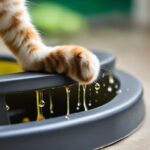If your cat has been diagnosed with urinary crystals, you may be wondering what the best food for them is. While there are many prescription diets available for cats with urinary crystals, there are also some good non-prescription foods that can help prevent these formations. In this article, we’ll discuss the best non-prescription cat food for urinary crystals, as well as some tips on how to switch your cat’s diet to a food that helps reduce the risk of developing these stones. We’ll also cover some of the other things you can do to help keep your cat’s urinary health in check, such as avoiding certain foods and supplements that can aggravate this condition.
Key Takeaways:
- Choosing the right cat food is important for cats with urinary crystals
- Non-prescription cat foods can help prevent the formation of urinary crystals
- Avoid certain foods and supplements that can aggravate urinary crystal formation
- Switching your cat’s diet should be done gradually to prevent stomach upset
- Monitor your cat’s urinary health and seek veterinary care if you notice any changes
Understanding Urinary Crystals in Cats
If your cat has been diagnosed with urinary crystals, it’s important to understand what they are and how they can affect your cat’s urinary health. Urinary crystals in cats can be caused by various factors, including dietary issues, disease, and infection. The most common type of urinary crystal is struvite, which is caused by a bacterial infection. Struvite crystals can cause severe illness and even be fatal if left untreated. Other types of crystals that can form in a cat’s urinary tract include calcium oxalate and urate, which are less common but can also lead to serious health problems.
Recognizing the symptoms of urinary crystals in cats is crucial for early diagnosis and treatment. Common signs include straining to urinate, increased frequency of urination, blood in the urine, increased thirst, vomiting, and lethargy. If you notice any of these symptoms, it’s important to seek veterinary care as soon as possible. Your vet can perform diagnostic tests, such as a urine test, to determine if urinary crystals are present and recommend appropriate treatment.
Preventing urinary crystals in cats requires a comprehensive approach. Besides the right diet, there are other steps you can take to support your cat’s urinary health. Increasing their water intake is essential to keep the urinary tract hydrated and help flush out crystals. You can also consider incorporating natural supplements, such as cranberry juice or unsweetened apple cider vinegar, to promote urinary health. Additionally, providing environmental enrichment and reducing stress can contribute to overall urinary tract well-being.

The Role of Diet in Preventing Urinary Crystals
Avoiding certain foods and incorporating specific dietary strategies can be beneficial in preventing the formation of urinary crystals in cats. It’s crucial to feed your cat a diet that is low in magnesium and sulfur, as these nutrients can contribute to crystal formation. High-protein foods should be avoided, as they tend to be rich in magnesium and sulfur. Opting for diets specifically formulated to prevent crystals can help reduce the risk.
Feeding your cat wet food can also promote urinary health. The higher moisture content in canned food helps keep the urinary tract hydrated and flush out debris that could lead to crystal formation. It’s essential to provide a balanced and appropriate diet that meets your cat’s nutritional needs while supporting their urinary health.
| Types of Urinary Crystals | Symptoms | Treatment |
|---|---|---|
| Struvite | Straining to urinate, increased frequency of urination, blood in the urine, increased thirst, vomiting, lethargy | Dietary changes, medication, surgery (in severe cases) |
| Calcium Oxalate | Straining to urinate, increased frequency of urination, blood in the urine, increased thirst, vomiting, lethargy | Dietary changes, medication, surgery (in severe cases) |
| Urate | Straining to urinate, increased frequency of urination, blood in the urine, increased thirst, vomiting, lethargy | Dietary changes, medication, surgery (in severe cases) |
“Recognizing the symptoms of urinary crystals in cats is crucial for early diagnosis and treatment.”
Tips for Choosing the Right Cat Food for Urinary Health
When it comes to selecting the right cat food for urinary health, there are a few important factors to consider. The first is to choose a diet that is low in magnesium and sulfur. These nutrients can contribute to the formation of urinary crystals, so it’s best to avoid cat food that contains high levels of protein, as it tends to be rich in magnesium and sulfur. Look for diets that are specifically designed to prevent crystal formation.
Another important consideration is the moisture content of the cat food. Wet food, such as canned cat food, is higher in moisture compared to dry kibble. This increased moisture helps to keep the urinary tract hydrated and flush out any debris that could lead to crystal formation. Feeding your cat wet food regularly can be beneficial for their overall urinary health.
It’s also a good idea to read the ingredients list of the cat food you’re considering. Look for high-quality ingredients that are easy for your cat to digest. Avoid foods that contain artificial colors, flavors, and preservatives, as these can potentially aggravate urinary issues. Additionally, consider consulting with your veterinarian for personalized recommendations based on your cat’s specific needs and health condition.
| Factors to Consider | Recommended Choices |
|---|---|
| Magnesium and sulfur content | Diets low in protein, specifically formulated for preventing crystals |
| Moisture content | Wet cat food, such as canned food |
| Ingredients | High-quality ingredients, free from artificial colors, flavors, and preservatives |
By considering these tips and choosing the right cat food for urinary health, you can help support your cat’s overall well-being and reduce the risk of urinary crystal formation.
The Best Non-Prescription Cat Food for Urinary Crystals
When it comes to non-prescription cat food for urinary crystals, several brands stand out. These options have been specifically designed to help dissolve and flush out urinary crystals and stones, promoting urinary health in cats.
I’ve gathered a list of some highly recommended non-prescription cat food options that can effectively support your cat’s urinary health:
| Brand | Features |
|---|---|
| Royal Canin Veterinary Diet Adult Urinary SO Moderate | This diet is formulated to be low in magnesium and phosphorus, which can aggravate crystal formation. It also contains added potassium to help keep the urine dilute. |
| Hill’s Prescription Diet c/d Multicare | This cat food has been proven to help keep crystals under control. It is specially formulated to promote urinary health and manage crystal formation. |
| Purina Pro Plan Veterinary Diets UR Stool Altering | This food is designed to help prevent the formation of urinary crystals. It has a balanced nutrition profile to support overall urinary health. |
| Iams Proactive Health Adult Urinary Tract | This cat food is formulated with targeted ingredients to support urinary health and reduce the risk of crystal formation. |
These non-prescription cat food options provide a balanced and targeted approach to supporting your cat’s urinary health. However, it’s essential to consult with your veterinarian before making any dietary changes for your cat. They can guide you in selecting the most suitable non-prescription cat food for your cat’s specific needs and monitor their urinary health progress.
Remember, ensuring your cat has access to fresh water and maintaining regular veterinary check-ups are also crucial for their overall urinary health and well-being.

Top Wet Cat Foods for Urinary Crystals
When it comes to supporting your cat’s urinary health, wet cat foods can be a great choice. They provide essential hydration and are often formulated to promote urinary tract health. Here are some top wet cat foods that can help prevent urinary crystals:
- Wellness Core Natural Grain-Free Wet Cat Food: This high-protein, grain-free wet food is an excellent option for cats with urinary crystals. It contains added moisture to support urinary tract health and is made with quality ingredients.
- Weruva Paw Lickin’ Good Canned Cat Food: This wet food is made with real meat and is low in phosphorus and magnesium, which can contribute to crystal formation. It’s a delicious option that promotes urinary health.
- Nature’s Variety Instinct Healthy Weight Grain-Free Wet Cat Food: Formulated with high-quality proteins and limited carbohydrates, this wet food is designed to help maintain a healthy weight while supporting urinary health.
These wet cat foods are specifically crafted to provide the right balance of nutrients and moisture to support a healthy urinary tract. Remember to consult with your veterinarian to determine the most suitable option for your cat’s specific needs.
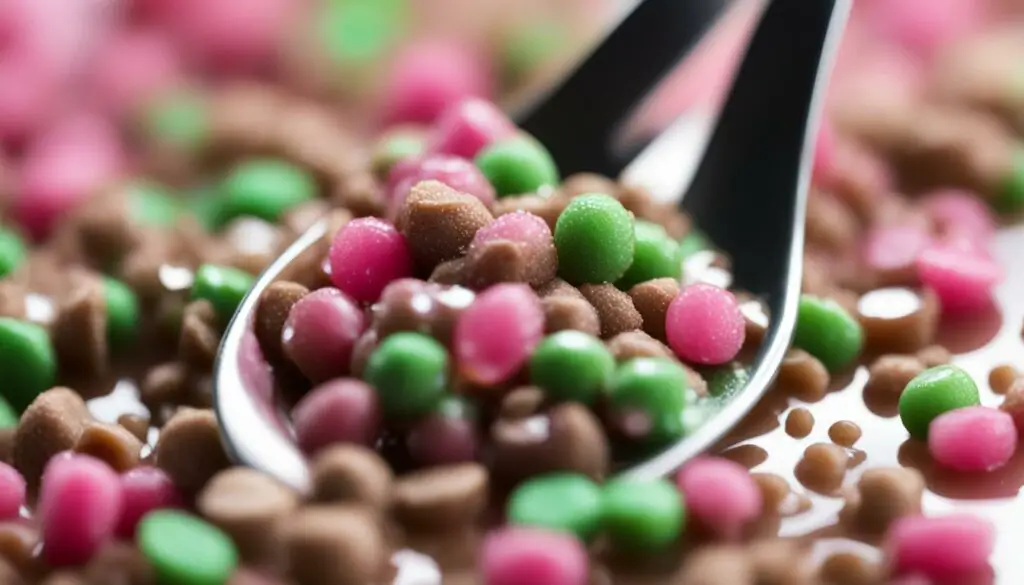
Comparative Table: Top Wet Cat Foods for Urinary Crystals
| Brand | Main Features |
|---|---|
| Wellness Core Natural Grain-Free Wet Cat Food | High-protein, grain-free, promotes urinary tract health |
| Weruva Paw Lickin’ Good Canned Cat Food | Real meat, low in phosphorus and magnesium, supports urinary health |
| Nature’s Variety Instinct Healthy Weight Grain-Free Wet Cat Food | High-quality proteins, limited carbohydrates, maintains healthy weight and urinary health |
Other Dietary Considerations for Urinary Health
Aside from choosing the right cat food, there are other dietary considerations that can contribute to your cat’s urinary health. It’s important to avoid feeding your cat foods that are high in purines, such as red meats, poultry, and seafood, as these can increase the risk of crystal formation in the urinary tract. Additionally, high-fat foods should be avoided, as they can also contribute to urinary issues.
To further support your cat’s urinary health, you may consider adding supplements to their diet. D-mannose is a natural supplement that can help prevent bacterial adherence in the urinary tract, reducing the risk of infections and crystal formation. Probiotics can also be beneficial, as they promote a healthy balance of bacteria in the gut, which in turn supports urinary health.
Omega-3 fatty acids are another important supplement for urinary health. These fatty acids have anti-inflammatory properties that can help reduce inflammation in the urinary tract and prevent the formation of crystals. You can find omega-3 supplements specifically formulated for cats to ensure they receive the proper dosage.
| Supplement | Benefits |
|---|---|
| D-mannose | Reduces the risk of bacterial infections and crystal formation |
| Probiotics | Promotes a healthy balance of bacteria in the gut, supporting urinary health |
| Omega-3 fatty acids | Reduces inflammation in the urinary tract and prevents crystal formation |
Remember, always consult with your veterinarian before adding any supplements to your cat’s diet. Your vet can provide guidance on the appropriate dosage and help determine which supplements are suitable for your cat’s specific needs.
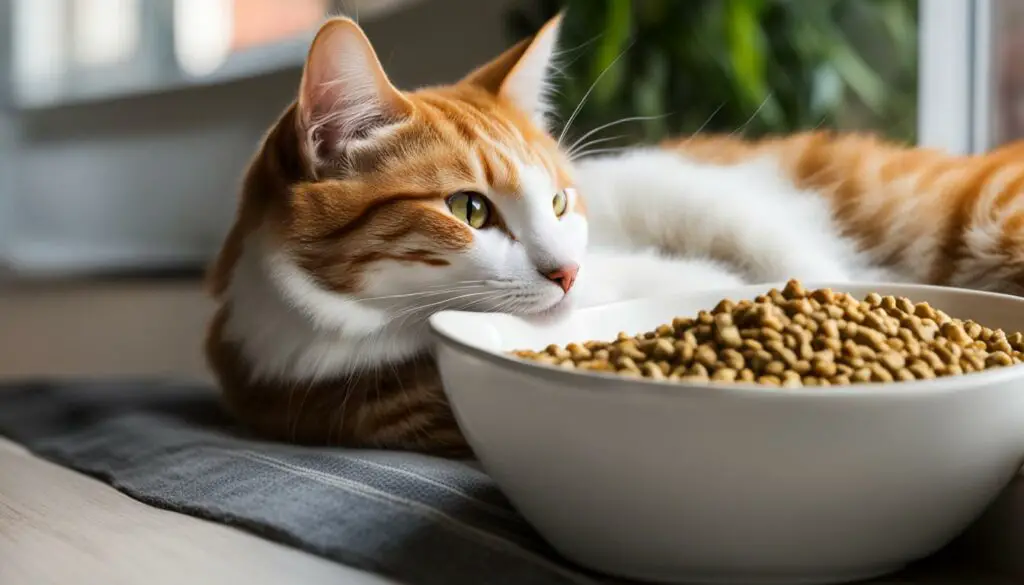
Tips for Switching Your Cat’s Diet
Making the switch to a new diet for your cat can be a bit challenging, but with the right approach, it can be a smooth transition. When switching your cat’s diet to a non-prescription food for urinary issues, it’s important to do it gradually to avoid any digestive upsets. Here are some tips to help you switch your cat’s diet successfully:
- Start by mixing a small amount of the new food with your cat’s current food. This will allow them to gradually get used to the new flavor and texture.
- Slowly increase the amount of the new food while decreasing the amount of the old food over a period of about a week. This gradual transition will help prevent any sudden changes in your cat’s digestion.
- Observe your cat’s reaction to the new food. If they are hesitant to eat it or show signs of stomach upset, you may need to slow down the transition process and give them more time to adjust.
- Stay patient and persistent. Cats can be creatures of habit, so it may take some time for them to fully accept the new food. Offer praise and positive reinforcement when they eat the new food to encourage them.
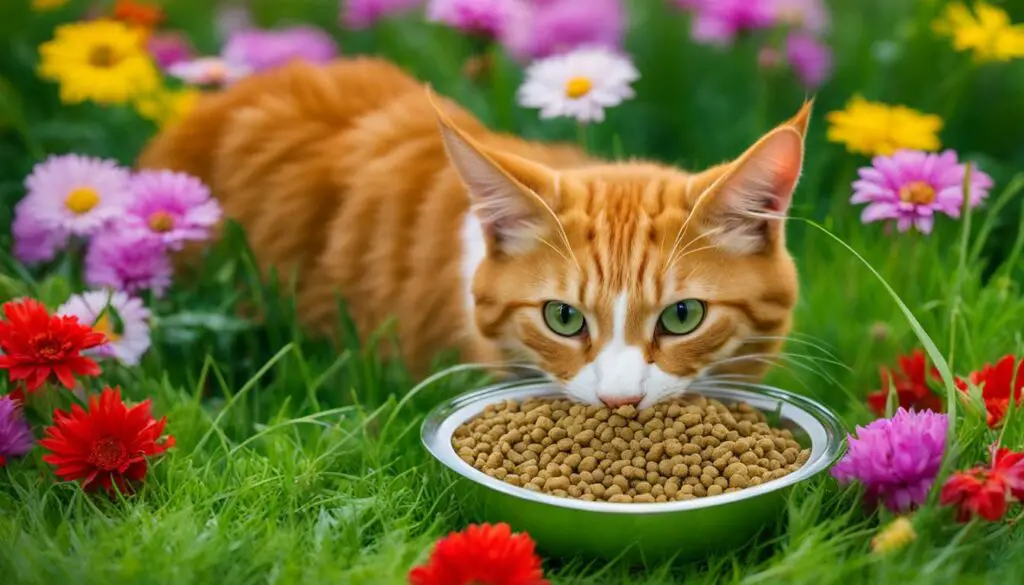
Remember, every cat is unique, and what works for one may not work for another. It’s important to consult with your veterinarian before making any dietary changes for your cat, especially if they have any underlying health conditions. Your vet can provide personalized recommendations and guidance based on your cat’s specific needs.
Switching your cat’s diet can be a positive step towards improving their urinary health. By following these tips and being patient with the transition process, you can help support your cat’s well-being and prevent urinary issues in the long run.
Monitoring Your Cat’s Urinary Health
Once you have switched your cat to a non-prescription cat food for urinary crystals, it is important to monitor their urinary health. By keeping a close eye on their urination habits and being vigilant for any changes or abnormalities, you can catch potential issues early and seek veterinary care if necessary.
Signs to watch out for include:
- Increased frequency of urination
- Straining or difficulty urinating
- Blood in the urine
- Increased thirst
- Vomiting
- Lethargy
If you observe any of these symptoms, it is crucial to take your cat to the vet for further evaluation. Your veterinarian can perform diagnostic tests, such as a urine analysis, to determine if there are any issues with your cat’s urinary health.
Regular check-ups and monitoring of your cat’s urinary health are essential for maintaining their overall well-being and preventing the recurrence of urinary crystals.
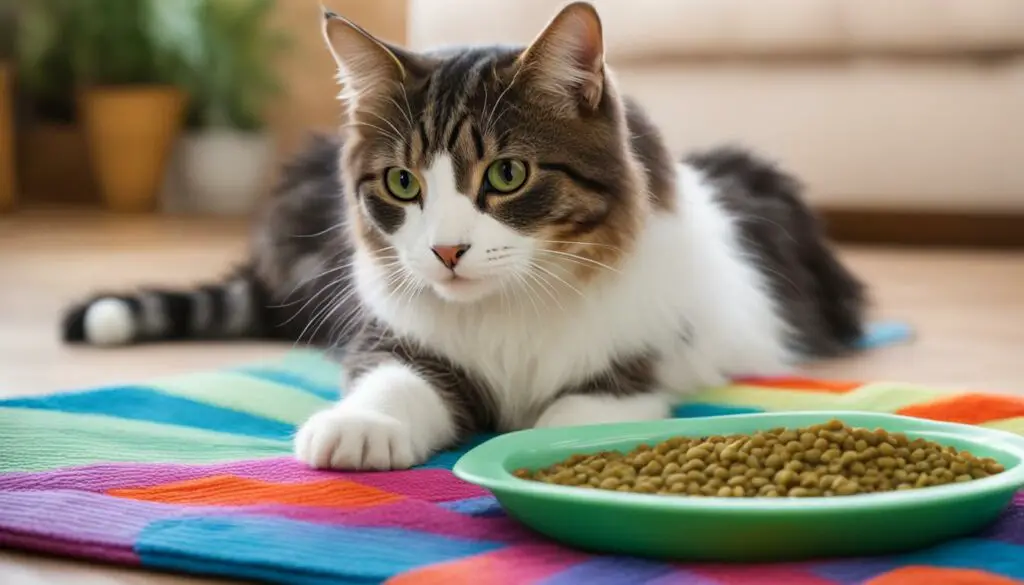
Table:
| Monitoring Your Cat’s Urinary Health | Signs to Watch Out for |
|---|---|
| Increased frequency of urination | – |
| Straining or difficulty urinating | – |
| Blood in the urine | – |
| Increased thirst | – |
| Vomiting | – |
| Lethargy | – |
Natural Ways to Support Your Cat’s Urinary Health
If you’re looking for natural ways to support your cat’s urinary health, there are several strategies you can try. These methods can complement a balanced diet and help reduce the risk of urinary crystals in cats. Some key approaches include:
- Increasing Water Intake: One way to support urinary health is by encouraging your cat to drink more water. You can achieve this by providing multiple clean water sources throughout your home and using pet water fountains. Cats are more likely to drink when their water is fresh and flowing.
- Adding Cranberry Juice or Apple Cider Vinegar: These natural remedies may help break down urinary crystals in cats. However, it’s important to consult with your veterinarian before adding any supplements or altering your cat’s diet.
- Providing Environmental Enrichment: A stress-free environment can promote overall urinary health. Interactive toys, scratching posts, and comfortable hiding spots can help reduce stress and anxiety in cats. Remember to spend quality time with your cat to provide mental and physical stimulation.
By incorporating these natural methods into your cat’s routine, you can help support their urinary health and contribute to their overall well-being.
Quote:
“Natural ways to support your cat’s urinary health can be beneficial in combination with a balanced diet and proper veterinary care. These methods focus on promoting hydration, providing supplements when appropriate, and creating a stress-free environment for your feline friend.” – Dr. Emily Thompson, DVM
Remember, if you suspect your cat has urinary crystals or is experiencing urinary issues, it’s essential to consult with a veterinarian. They can provide a proper diagnosis, recommend appropriate treatments, and guide you on the best ways to support your cat’s urinary health.
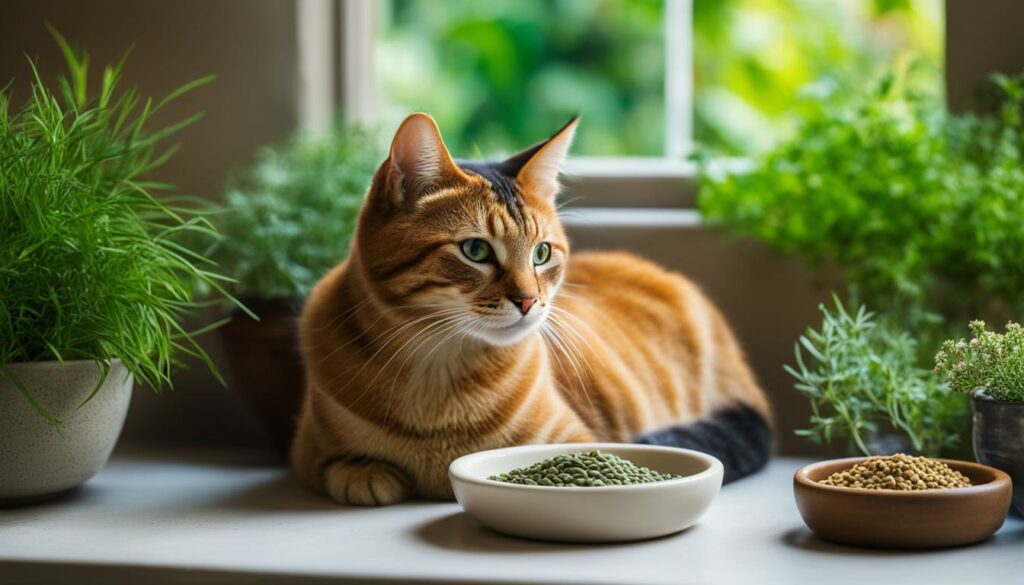
Recognizing the Signs of Urinary Crystals in Cats
Being able to recognize the signs of urinary crystals in cats is crucial for early detection and treatment. When left untreated, urinary crystals can lead to severe health issues for your feline companion.
Common symptoms of urinary crystals in cats include straining to urinate, increased frequency of urination, blood in the urine, increased thirst, vomiting, and lethargy. It’s important to note that these symptoms can also be indicative of other urinary tract problems, so it’s essential to consult with a veterinarian for an accurate diagnosis.
Early intervention is key when dealing with urinary crystals. If you notice any of these symptoms or suspect that your cat may be experiencing urinary issues, it is crucial to seek veterinary care as soon as possible. The veterinarian can perform a simple urine test to diagnose the presence of crystals and recommend the appropriate treatment plan.
| Symptoms of Urinary Crystals in Cats |
|---|
| Straining to urinate |
| Increased frequency of urination |
| Blood in the urine |
| Increased thirst |
| Vomiting |
| Lethargy |
By being vigilant and proactive in monitoring your cat’s urinary health, you can ensure prompt treatment and prevent any complications associated with urinary crystals.
Understanding the Importance of Veterinary Care for Urinary Crystals
If your cat is diagnosed with urinary crystals, it’s important to follow the veterinarian’s recommendations for treatment and management. Crystals can lead to serious health problems if left untreated, including blockages that can be life-threatening. Your vet may prescribe a special diet to dissolve the crystals and prevent their recurrence. In some cases, surgery may be necessary to remove the crystals. Regular check-ups and monitoring of your cat’s urinary health are crucial for their overall well-being.
Urinary crystals in cats can be caused by a variety of factors, and proper veterinary care is essential for accurate diagnosis and appropriate treatment. The vet will perform diagnostic tests to determine the type of crystals present and the best course of action. By working closely with your vet, you can ensure that your cat receives the necessary care to alleviate their symptoms and prevent further complications.
Additionally, veterinary care plays a vital role in monitoring your cat’s progress and making any necessary adjustments to their treatment plan. Regular check-ups allow the vet to assess the effectiveness of the prescribed diet and make any necessary modifications. They can also provide guidance on maintaining your cat’s urinary health and offer advice on environmental enrichment and other supportive measures.
Key Takeaways:
- Following your vet’s recommendations is crucial for treating urinary crystals in cats.
- Veterinary care includes diagnostic tests, treatment plans, and regular check-ups.
- Proper care can prevent complications and ensure your cat’s overall well-being.
Remember, always consult with your veterinarian for personalized advice and guidance regarding your cat’s urinary health. They have the expertise to provide tailored recommendations based on your cat’s specific needs and circumstances. By prioritizing veterinary care and working in partnership with your vet, you can give your cat the best chance at maintaining a healthy urinary tract and overall wellness.
| Veterinary Care for Urinary Crystals | Benefits |
|---|---|
| Accurate diagnosis | Determines the type of crystals and appropriate treatment |
| Treatment plan | Prescribes a specialized diet and, if necessary, surgery |
| Regular check-ups | Monitors progress and makes adjustments to the treatment plan as needed |
| Prevention and support | Provides guidance on maintaining urinary health and offers advice on environmental enrichment |
The Role of Hydration in Urinary Health
When it comes to maintaining your cat’s urinary health, hydration plays a crucial role. Adequate hydration helps to flush out toxins from your cat’s urinary tract, dilute their urine, and reduce the risk of crystal formation. Water is essential for preventing urinary crystals in cats. It is recommended to provide your cat with clean, fresh water at all times.
If your cat is not a big drinker, there are a few strategies you can try to encourage them to drink more water. Consider investing in a water fountain, as many cats are attracted to the sound and movement of running water. You can also try using larger water bowls placed in different locations throughout your home to increase access. Keeping your cat well-hydrated is an important step in preventing urinary crystals.
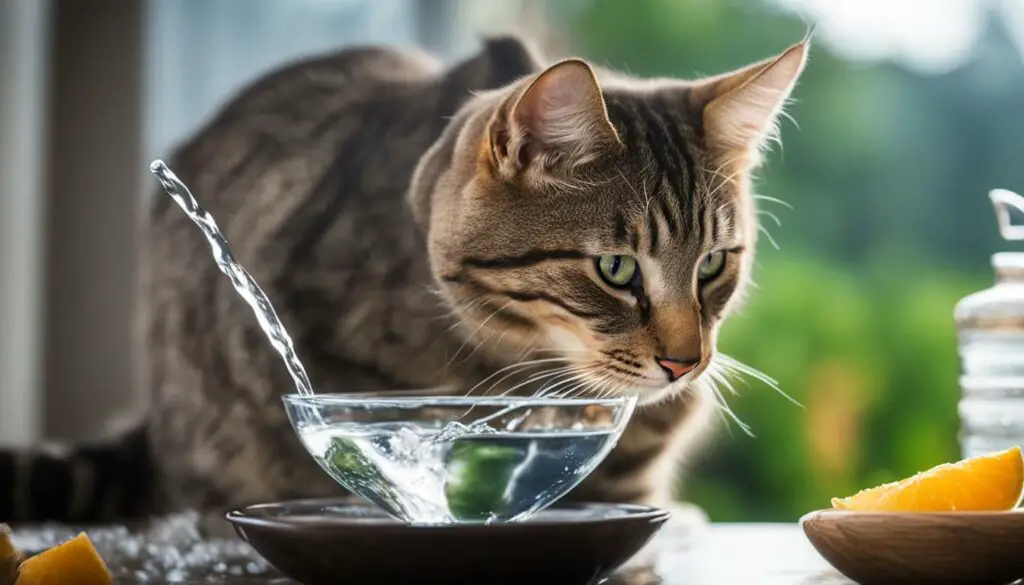
In addition to water, wet cat food can contribute to your cat’s hydration. Wet food has a higher moisture content compared to dry food, which can help support their urinary health. Consider incorporating wet food into your cat’s diet as part of a holistic approach to preventing urinary crystals.
Proper hydration is key to maintaining your cat’s urinary health and reducing the risk of crystal formation. By ensuring your cat has access to water and incorporating wet food into their diet, you can help support their overall well-being and reduce the likelihood of urinary issues.
Maintaining a Healthy Weight for Urinary Health
When it comes to maintaining your cat’s urinary health, one important factor to consider is their weight. Obesity can increase the risk of urinary issues, including the development of crystals. Ensuring that your cat maintains a healthy weight is essential for their overall well-being and urinary health.
To help your cat maintain a healthy weight, it’s important to feed them an appropriate portion size of cat food for urinary issues. Consult with your veterinarian to determine the ideal weight for your cat and develop a feeding plan that suits their needs. Avoid overfeeding and limit the intake of high-calorie treats that can contribute to weight gain.
Regular exercise is also crucial for weight management. Engage your cat in playtime activities to keep them active and burn calories. Provide them with toys and interactive play sessions to encourage physical activity. Additionally, consider providing scratching posts and climbing trees to stimulate their natural instincts and help them stay active.
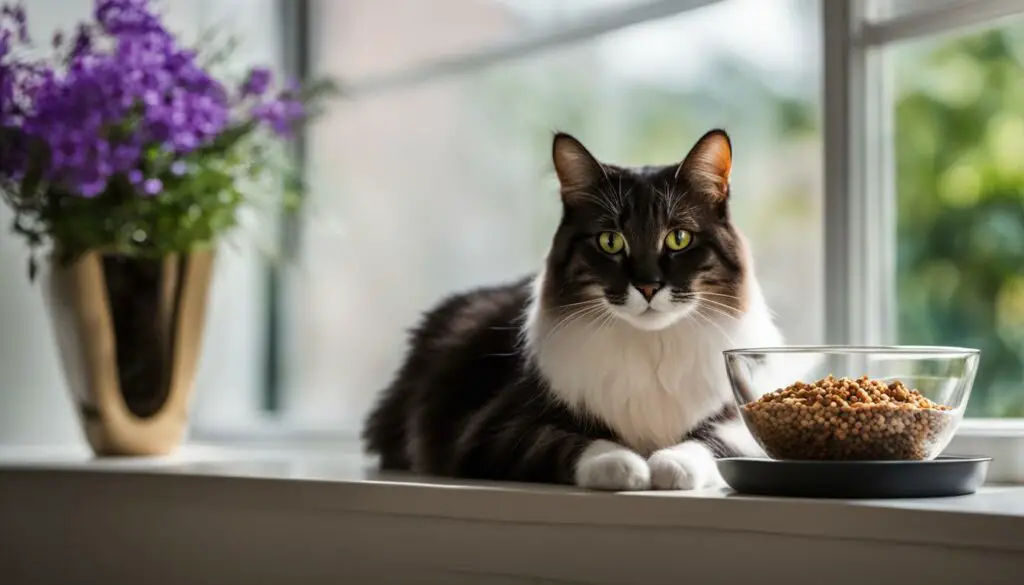
The Importance of Weight for Urinary Health
Maintaining a healthy weight plays a vital role in your cat’s urinary health. Excess weight can lead to inflammation and increased pressure on the bladder, making it harder for your cat to empty their bladder fully. This can contribute to the development of urinary crystals and other urinary tract issues.
Furthermore, overweight cats are more prone to developing diabetes, which can also increase the risk of urinary problems. By helping your cat maintain a healthy weight, you can reduce the likelihood of these issues and support their urinary health.
In conclusion, maintaining a healthy weight is an important aspect of promoting urinary health in cats. Through proper portion control, regular exercise, and consultation with your veterinarian, you can help your cat maintain an optimal weight and reduce the risk of urinary issues. By prioritizing your cat’s weight management, you are taking an active step in safeguarding their overall well-being and urinary health.
Conclusion
In conclusion, choosing the best non-prescription cat food for urinary crystals is crucial for maintaining your cat’s urinary health. By addressing their specific dietary needs and considering factors such as wet or dry food preferences, you can provide optimal nutrition that helps prevent the formation of urinary crystals.
Urinary crystals in cats can lead to serious health issues if left untreated. Therefore, it is essential to monitor your cat’s urinary health and seek veterinary care at the first sign of symptoms. Regular check-ups and following your vet’s recommendations for treatment and management are key.
Alongside the right diet, other measures can also support your cat’s urinary health. Increasing their water intake, avoiding certain foods, and adding supplements such as d-mannose and omega-3 fatty acids can contribute to a healthy urinary tract.
Remember, every cat is unique, so consulting with your veterinarian is vital for personalized advice. With the right non-prescription cat food and proper care, you can help prevent urinary crystals and promote overall urinary health, ensuring your furry companion leads a happy and healthy life.
FAQ
What causes urinary crystals in cats?
Urinary crystals in cats can be caused by dietary issues, disease, and infection. The most common type of urinary crystal is struvite, which is caused by a bacterial infection. Other types of crystals that can form in a cat’s urinary tract include calcium oxalate and urate.
How can I prevent urinary crystals in my cat?
Feeding your cat a diet low in magnesium and sulfur can help prevent urinary crystals. Avoiding foods high in protein, providing a diet high in moisture, and adding supplements such as d-mannose, probiotics, and omega-3 fatty acids can also support urinary health.
What are some non-prescription cat foods for urinary crystals?
Some recommended non-prescription cat foods for urinary crystals include Royal Canin Veterinary Diet Adult Urinary SO Moderate, Hill’s Prescription Diet c/d Multicare, Purina Pro Plan Veterinary Diets UR Stool Altering, Iams Proactive Health Adult Urinary Tract, Wellness Core Natural Grain-Free Wet Cat Food, Weruva Paw Lickin’ Good Canned Cat Food, and Nature’s Variety Instinct Healthy Weight Grain-Free Wet Cat Food.
How do I switch my cat’s diet to a food that helps prevent urinary crystals?
Slowly transition your cat to the new food by mixing a small amount with the old food and gradually increasing the amount of new food. This helps prevent stomach upset. Monitor your cat’s urinary health during the transition and seek veterinary care if any abnormalities occur.
What are the signs of urinary crystals in cats?
Common signs of urinary crystals in cats include straining to urinate, increased frequency of urination, blood in the urine, increased thirst, vomiting, and lethargy. If you notice any of these symptoms, it is crucial to seek veterinary care as soon as possible.
How important is veterinary care for urinary crystals?
Veterinary care is essential for diagnosing and treating urinary crystals in cats. The vet can perform diagnostic tests, prescribe a special diet, and recommend treatment options to prevent serious health problems. Regular check-ups and monitoring are crucial for your cat’s overall well-being.
What role does hydration play in urinary health?
Adequate hydration is important for maintaining urinary health in cats. Ensure your cat has access to clean, fresh water at all times. Incorporating wet food into their diet and providing water fountains or larger water bowls can encourage them to drink more and flush out toxins.
Can maintaining a healthy weight support urinary health?
Yes, maintaining a healthy weight is crucial for urinary health in cats. Obesity can increase the risk of urinary issues. Feed your cat an appropriate portion size and provide regular exercise to help them maintain a healthy weight.
Source Links
- https://www.petsmotherland.com/best-non-prescription-cat-food-for-urinary-crystals/
- https://www.thesprucepets.com/best-cat-foods-for-urinary-tract-health-4692666
- https://cats.com/best-cat-food-urinary-tract-health







